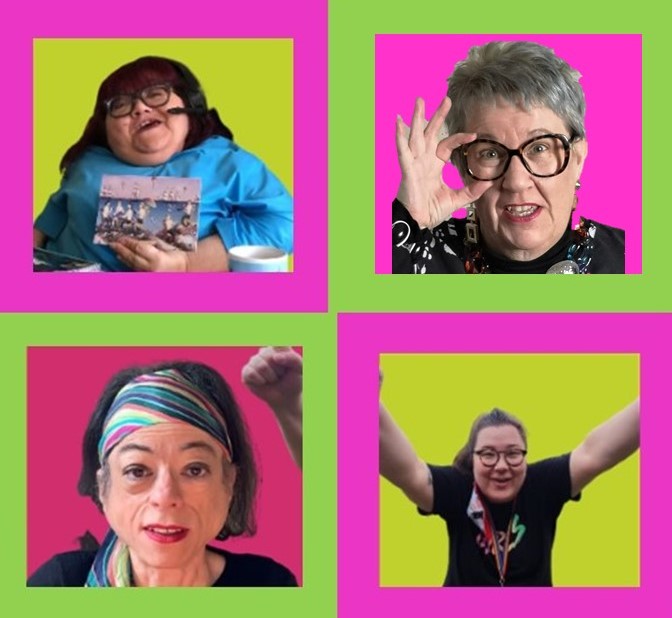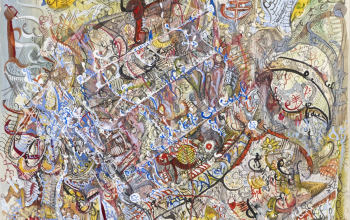Losing your identity, your sense of humour and your smile reflex are serious concerns during this period, particularly as we head into Lockdown 2 or, for those of us who have had to shield, November. These are the sparkly bits of us that make us who we are, and they are every bit important. One thing we can do to help prevent these losses is to watch more of the new work that has been made during this bizarre year by national theatre companies and artists, not just absorbing binge-worthy shows on Netflix, however fantastically escapist they are.
Little Cog Theatre are a disability-led theatre company based in the North East, set up by the wonderful Vici Wreford-Sinnott in 2011. I’ve been very fortunate to connect with them during lockdown, and am keen not just to promote their work but to encourage people to attend their masterclasses and launch events. We are fortunate at the moment in that we have the opportunity to see work from areas we otherwise might not physically have been able to travel to in order to see a theatre show. The addition of being able to, from bed, attend launch events and hear from the writers and performers themselves is the cherry on the cake with this new way in which we share work.
Funny Peculiar is the product of an initially tentative experiment by Vici Wreford-Sinnott re-exploring previous forays into comedy-writing. And my, oh my, is it successful! She has created a piece of work, along with a phenomenally talented cast, that makes sure that always-fighting, ever-talented and truly resilient disabled women of all ages do not become invisible during this pandemic. Alongside Vici herself, Liz Carr, Mandy Colleran and Bea Webster, play four hilarious characters, all disabled women who are experiencing lockdown under slightly different circumstances, and all of whom speak directly to camera as they try to navigate the not-entirely-new terrain of lockdown life. The mockumentary is just the perfect stylistic medium under the current circumstances. It makes the inevitability of actors being at home totally appropriate, even comforting, and you get something that you don’t always get with live theatre: the feeling of making direct eye contact with every single character, and they are looking at and speaking to you, and you alone.

A headshot of Liz Carr in character as Zsa Zsa. She poses classily, looking up and to her left, just past the camera. She is a white woman in her forties, wearing bright pink lipstick, a rainbow coloured headscarf, and stylish, large tortoise-shell sunglasses. 
Mandy Colleran as Blanche sits in front of a tall bookcase, facing a silver laptop. She is a white woman in her fifties, and wears a bright blue top and seems to be chatting enthusiastically into a wireless headset. 
This image shows Bea Webster who is a mixed race young woman of dual heritage, Thai and Scottish, with long brown hair and a black top. It says the word girls on it in mixed colours. She has two arms raised as if she has won a race.
The four monologues cut across one another perfectly, the subtle intersecting link between Zsa Zsa and Blanche’s scenarios being one of my favourite little titbits. All performers are passionate and perfect, not only as vehicles for that dark humour that many disabled women often harness, but as worthy representatives of what Carr has referred to in this context as the ‘fight for our very existence [as disabled women] not just during this pandemic – but always’ (Carr, Funny Peculiar).
We get to meet Zsa Zsa, fashion-world sophisticate extraordinaire (Liz Carr) who may have a sourdough in the oven, or may just not want to talk to you anymore; Blanche, presiding over organised community fun (Mandy Colleran); Cuba, the video-gamer who volunteers for her neighbourhood food-bank (Bea Webster); and Raquel Squelch (a name I challenge you to beat) who myth-busts her way through the show, sharing anecdotes that are both funny and appalling, but always thought-provoking (Vici Wreford-Sinnott). They remind us that the degrading views and oppressive structures that hurt women in our society are there, hurting disabled women just as much, even before we begin to think about the barriers that society puts in place to exclude disabled people from its mainstream clique.
The show is written and directed by the very talented Vici, who says that the performers were unanimous in their enthusiasm to create this piece, having agreed that there is little chance of their usual broadcasters putting together any work like this. If the main fight of this piece is against the potential for this lockdown (and the last) to make disabled women invisible, or slowly ‘disappear from view’, then it has exceeded its own goals. By watching Funny Peculiar, we don’t just see these characters, but we laugh with them, we listen to them, we feel angry with them and we want them to win. We want to say ‘Fuck you!’ to the fashion business, to everyone who shouts at Cuba as though that makes her hear better, to Raquel Squelch’s mother whose expectations are insultingly low and to… well actually, Blanche is not only hilarious – truly incredible performance given by Colleran – but very positive about the who’s who and the what’s what of her community. Colleran’s comic timing is perfect, her monologue hilarious and her character Blanche is like a sunflower in the meadow of the others’ sharp wit and dark humour.
We can watch shiny, high-budget on-demand dramas in or out of lockdown, and we get what we want from them. They are glossy but they aren’t personal, or at least, they don’t make us feel special. What we desperately need right now is to remember, notice and smile at each other. We need to appreciate one-another’s work, creative output and ways of coping during this challenging and unprecedented period. When people need to be seen, we need to go out of our way to see them. When people need to be heard, we need to choose to listen. Funny Peculiar is the perfect antidote to the isolation and forgetting how to smile we are all in danger of over the coming months. I cannot recommend it more.
Oh, and I forgot to mention, it’s free! How do you watch it? Just head over to Little Cog’s website. Details are listed below:
Funny Peculiar is available to watch for free at Little Cog’s website.
ACCESS INFORMATION: There are three versions of the video, one as standard with closed captioning; one with BSL description; and one with audio description.
Image Description of cover photo: Four portraits of disabled women. Top left is Mandy Colleran as Blanche. She is a white woman in her fifties wearing a blue top and a headset and mic for her zoom meeting. She is a wheelchair user. Top right is Vici Wreford-Sinnott who plays Raquelle. She is a white woman in her fifties with spiky blond hair. She is smiling and looking upwards. Liz Carr is bottom left who is a white woman in her forties, seated in her wheelchair, with a dark brown bob haircut, a stylish long striped scarf in her hair and she is wearing a black top. Bottom right is Bea Webster who is a mixed race woman of dual heritage, Thai and Scottish, with long brown hair and a black top. It says the word girls on it in mixed colurs. She has two arms raised as if she has won a race.



